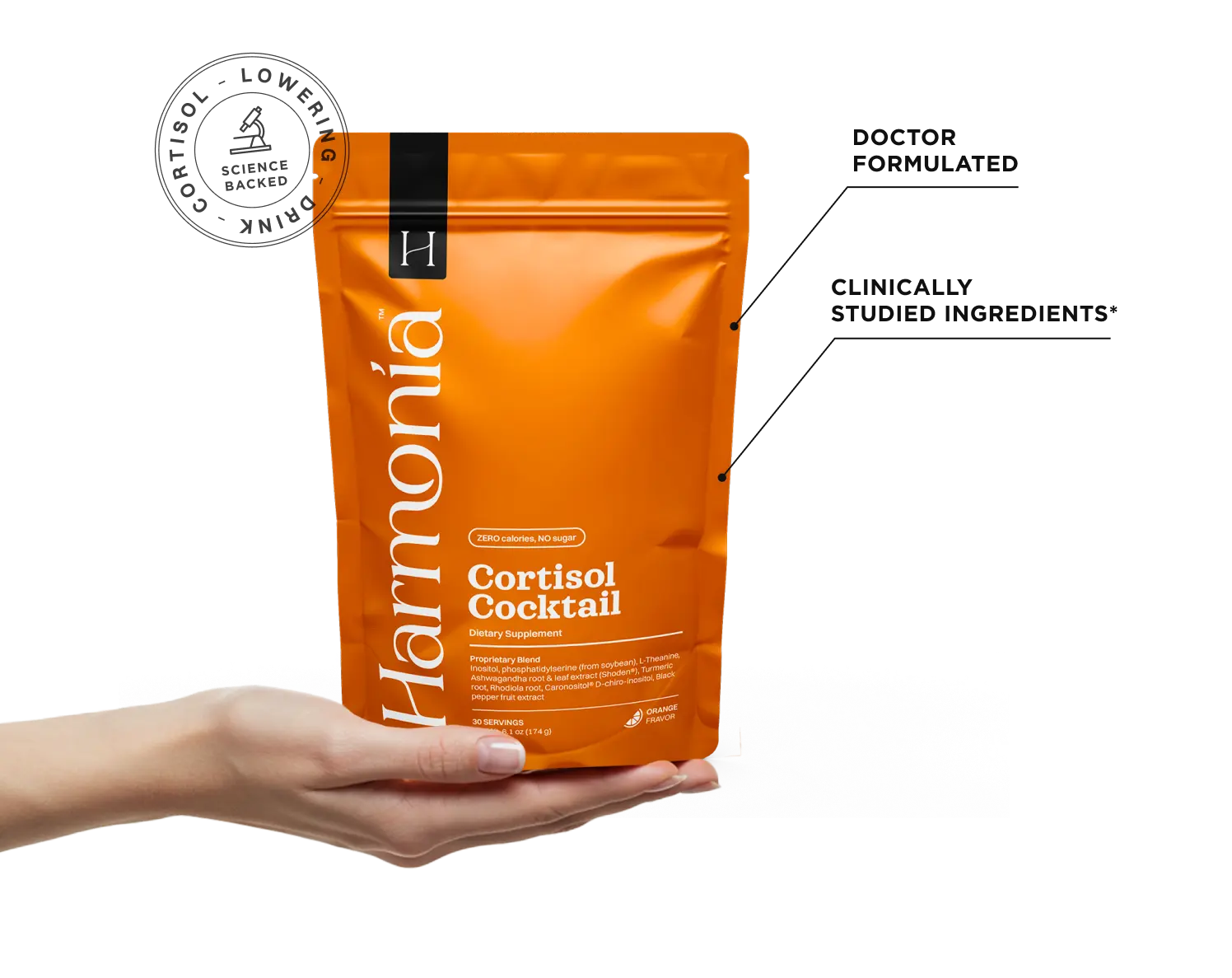Polycystic Ovary Syndrome (PCOS) is one of the most common hormonal conditions affecting women, yet it’s far from simple. While many people think of PCOS as being driven by insulin resistance, there are actually several types - including one that’s often overlooked: adrenal PCOS.
Adrenal PCOS is linked to your adrenal glands, the tiny organs above your kidneys that produce cortisol (the “stress hormone”) and adrenaline. For some women, constant stress keeps the adrenal system in overdrive, which leads to hormone imbalances, fatigue, mood changes, and irregular cycles.
If you’ve been struggling with exhaustion, anxiety, or hormonal chaos and wondered whether stress could be fueling your PCOS, you’re not alone. Here we’ll explore the most common adrenal PCOS symptoms, what causes them, and how you can manage them.
What Is Adrenal PCOS?
When most people think of PCOS, they picture insulin resistance as the main driver. While that’s true for many women, not all PCOS is the same. In fact, there are several types - and one of the lesser-known but very real subtypes is adrenal PCOS.
Unlike insulin-resistant PCOS, which is tied to blood sugar and insulin regulation, adrenal PCOS is rooted in dysregulated adrenal gland activity. Your adrenal glands, located above the kidneys, play a vital role in producing:
- Cortisol - the primary stress hormone that helps regulate your body’s response to pressure, danger, or daily demands.
- DHEA-S (Dehydroepiandrosterone Sulfate) - an androgen (male-type hormone) that, in excess, contributes to acne, hair growth, and ovulation problems.
- Adrenaline & norepinephrine - fight-or-flight hormones that also impact energy, mood, and metabolism.
In women with adrenal PCOS, the adrenal glands overproduce DHEA-S and other androgens - especially in response to stress. This excess androgen production disrupts normal ovulation, menstrual cycles, and overall hormone balance.
When your stress response is constantly triggered, your adrenal system goes into overdrive. This not only elevates cortisol but also floods your body with androgens, leading to symptoms like fatigue, anxiety, irregular periods, and difficulty conceiving.
That’s why adrenal PCOS is often called “stress-induced PCOS.” Unlike other PCOS types, it’s less about diet alone and more about how your body handles stress.
If your PCOS symptoms flare during times of stress - even if your blood sugar is normal - you may be dealing with adrenal PCOS.
Common Adrenal PCOS Symptoms in Females

Recognizing adrenal PCOS symptoms is crucial for getting the right treatment. Unfortunately, many women dismiss these warning signs as nothing more than “everyday stress” or “just being tired.” In reality, these symptoms reflect a deeper hormonal imbalance that goes beyond temporary fatigue.
Adrenal PCOS happens when the adrenal glands release excess stress hormones and androgens. This creates a ripple effect throughout the body - impacting energy, mood, metabolism, and reproductive health.
Physical Symptoms of Adrenal PCOS
Women with adrenal PCOS often experience symptoms that look similar to other PCOS types but are uniquely tied to adrenal function:
- Chronic fatigue and low energy: Persistent tiredness, even after adequate rest, is one of the most common adrenal fatigue PCOS symptoms. Many women describe it as “hitting a wall” mid-day or never feeling fully refreshed.
- Irregular or absent periods: High adrenal androgens can suppress ovulation, leading to cycle irregularities or skipped periods.
- Weight gain or stubborn weight loss resistance: Excess cortisol promotes fat storage, especially around the abdomen. Coupled with increased carb cravings, this makes weight management difficult (PCOS fatigue treatment often focuses on cortisol balance for this reason).
- Skin and hair changes: Elevated androgens may cause acne, hair thinning on the scalp, or excess hair growth on the face and body (hirsutism).
- Digestive issues: Stress hormones can disrupt gut health, leading to bloating, constipation, or IBS-like symptoms.
Emotional & Mental Symptoms of Adrenal PCOS
Beyond the physical effects, adrenal PCOS also disrupts brain chemistry, which is why emotional symptoms are so common.
- Anxiety and mood swings: Many women with adrenal PCOS report sudden irritability, heightened stress sensitivity, and feelings of overwhelm (adrenal symptoms in females often show up this way).
- Brain fog and poor concentration: Elevated cortisol impairs cognitive function, leading to memory lapses and difficulty focusing.
- Sleep disturbances: Trouble falling asleep, waking multiple times at night, or feeling unrefreshed despite 7-9 hours of rest are hallmark symptoms of adrenal PCOS.
- Low resilience to stress: Small stressors feel overwhelming, and recovery after a stressful event can take much longer than usual.
How Adrenal PCOS Symptoms Differ From Adrenal Fatigue
Adrenal PCOS symptoms often overlap with adrenal fatigue, but there’s a key distinction: adrenal PCOS not only affects stress and energy but also directly interferes with reproductive hormones and ovulation.
This means symptoms like irregular cycles, fertility challenges, and androgen-driven changes (acne, hair issues) are more prominent in adrenal PCOS compared to adrenal fatigue alone.
If you’re experiencing a mix of stress-related symptoms and hormonal disruptions, it’s worth exploring whether adrenal PCOS could be the underlying cause.
Can Stress Cause PCOS? The Stress–Cortisol Connection

One of the most common questions women ask is, “Can stress cause PCOS?” While stress alone isn’t the root cause of all cases of PCOS, it plays a major role in triggering and worsening adrenal PCOS symptoms - and for many women, it’s the missing piece of the puzzle.
When you experience ongoing physical or emotional stress, your body releases cortisol, the primary stress hormone produced by the adrenal glands.
In short bursts, cortisol helps you stay alert and energized. But when stress becomes chronic - think sleepless nights, overworking, emotional strain, or constant multitasking - your adrenal glands stay switched on, producing excess cortisol and other stress hormones.
That’s why managing stress isn’t optional; it’s essential. Many women find that adding Harmonia Cortisol Cocktail to their routine helps smooth the body’s stress response, promoting calmer energy, steadier hormones, and a more balanced mood.
How to Treat Adrenal PCOS Naturally
The encouraging news is that adrenal PCOS can often be managed - and even reversed - through a holistic approach that targets the root cause: stress and adrenal hormone imbalance.
Unlike insulin-resistant PCOS, the key here is to calm the body’s stress response, support adrenal health, and nourish hormonal balance through food, lifestyle, and targeted supplementation.
Healing adrenal fatigue PCOS symptoms requires patience and consistency. The goal isn’t to push harder but to help your body feel safe again - so your cortisol, DHEA-S, and reproductive hormones can naturally realign.
1. Adrenal PCOS Diet: Nourish to Regulate Hormones
A well-balanced adrenal PCOS diet is the foundation of hormonal recovery. Food directly impacts cortisol, insulin, and inflammation - three major factors in PCOS.
Focus on:
- Protein at every meal: Eggs, fish, legumes, tofu, and lean meats help stabilize blood sugar and cortisol.
- Healthy fats: Avocado, olive oil, nuts, seeds, and fatty fish promote hormone production.
- Complex carbohydrates: Quinoa, oats, and sweet potatoes provide steady energy and prevent cortisol spikes.
- Anti-inflammatory foods: Leafy greens, turmeric, berries, and omega-3-rich foods lower inflammation and support adrenal health.
- Mineral-rich hydration: Coconut water, herbal teas, or electrolyte blends to replenish magnesium and potassium.
Avoid:
- Caffeine overload, which overstimulates the adrenal glands.
- Refined sugar and processed foods, which cause blood sugar crashes and cortisol surges.
- Extreme dieting or skipping meals, which signal “stress” to the body.
Balanced eating every 3–4 hours helps keep cortisol stable and energy consistent throughout the day.
2. Lifestyle Changes: Reset Your Stress Response

Your daily routine has a profound impact on adrenal health. Healing adrenal PCOS isn’t just about what you eat - it’s also about how you rest, move, and manage your mental load.
Supportive lifestyle strategies:
- Stress management: Yoga, breathwork, journaling, or mindfulness meditation lower cortisol and help the nervous system reset.
- Prioritize quality sleep:Aim for 7–9 hours nightly, going to bed and waking at consistent times. Sleep regulates both cortisol and reproductive hormones.
- Gentle movement: Walking, Pilates, or strength training are ideal. Avoid high-intensity workouts that spike cortisol.
- Limit overstimulation: Reduce screen time, multitasking, and social media noise that keeps your brain “on alert.”
- Emotional connection: Spending time with supportive people, laughter, and joy physically lower stress hormones.
Small, consistent changes can dramatically shift your adrenal and hormonal balance.
3. Supplements for Adrenal PCOS: Target the Root Cause
Certain nutrients and botanicals - especially adaptogens - help rebalance the stress response and support adrenal recovery. These supplements for adrenal PCOS can enhance hormone balance, energy, and emotional well-being.
Top recommended nutrients and adaptogens:
- Ashwagandha: Lowers cortisol, improves mood, and supports thyroid function.
- Rhodiola Rosea: Enhances energy, stamina, and emotional resilience.
- Myo-Inositol & D-Chiro Inositol: Balance insulin sensitivity, promote ovulation, and improve hormonal ratios.
- Magnesium: Reduces anxiety, improves sleep, and supports adrenal enzymes.
- Vitamin D & B Vitamins: Essential for hormone synthesis, energy, and stress adaptation.
- Omega-3 Fatty Acids: Combat inflammation and improve cell receptor sensitivity.
Together, these nutrients form a powerful toolkit for reversing adrenal PCOS naturally - but taking multiple separate supplements daily can be overwhelming.
You can’t “push through” adrenal PCOS - you have to nourish, rest, and rebalance. With a nutrient-dense diet, restorative habits, and targeted support from Harmonia’s adaptogenic blend, your body can heal from stress-induced imbalance and regain its natural rhythm.
Consistency and self-care aren’t luxuries - they’re the foundation for reversing adrenal fatigue PCOS symptoms and restoring energy, focus, and confidence.
How Harmonia Supports Women With Adrenal PCOS

Managing adrenal PCOS symptoms isn’t just about changing your diet - it’s about helping your body recover from chronic stress and restoring hormonal harmony.
Formulated to target cortisol imbalance and support adrenal health, Harmonia combines adaptogens, vitamins, and plant-based nutrients that work together to calm your stress response, balance hormones, and boost natural energy.
Unlike stimulants or quick fixes, Harmonia supports your body’s own rhythm - helping you feel balanced, focused, and in control again.
Why Harmonia Works for Adrenal PCOS
Harmonia helps regulate the key hormones involved in adrenal gland PCOS by:
- Reducing cortisol levels naturally, easing the symptoms of stress-driven PCOS.
- Improving sleep quality, breaking the cycle of fatigue and irritability.
- Supporting hormonal balance, helping regulate estrogen, progesterone, and insulin.
- Enhancing steady energy and focus, without caffeine crashes or jitters.
Women using Harmonia often notice they sleep more soundly, wake up with more energy, and experience fewer cravings and mood swings. Over time, many also report improved menstrual regularity and a renewed sense of calm and focus.
Take the quiz to see if Harmonia is right for you - or buy now with free U.S. shipping.
References
- Moran, C., & Azziz, R. (2001). The role of the adrenal cortex in polycystic ovary syndrome. Obstetrics and gynecology clinics of North America, 28(1), 63-75. Link.
- Yildiz, B. O., & Azziz, R. (2007). The adrenal and polycystic ovary syndrome. Reviews in Endocrine and Metabolic Disorders, 8(4), 331-342. Link.







